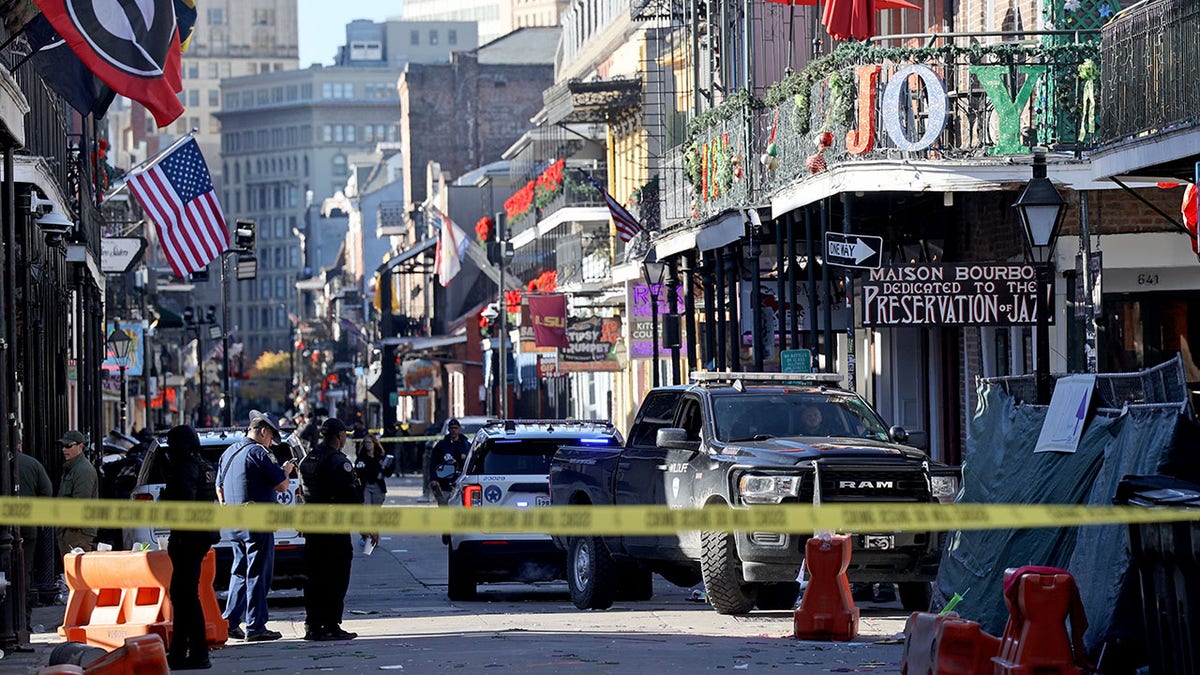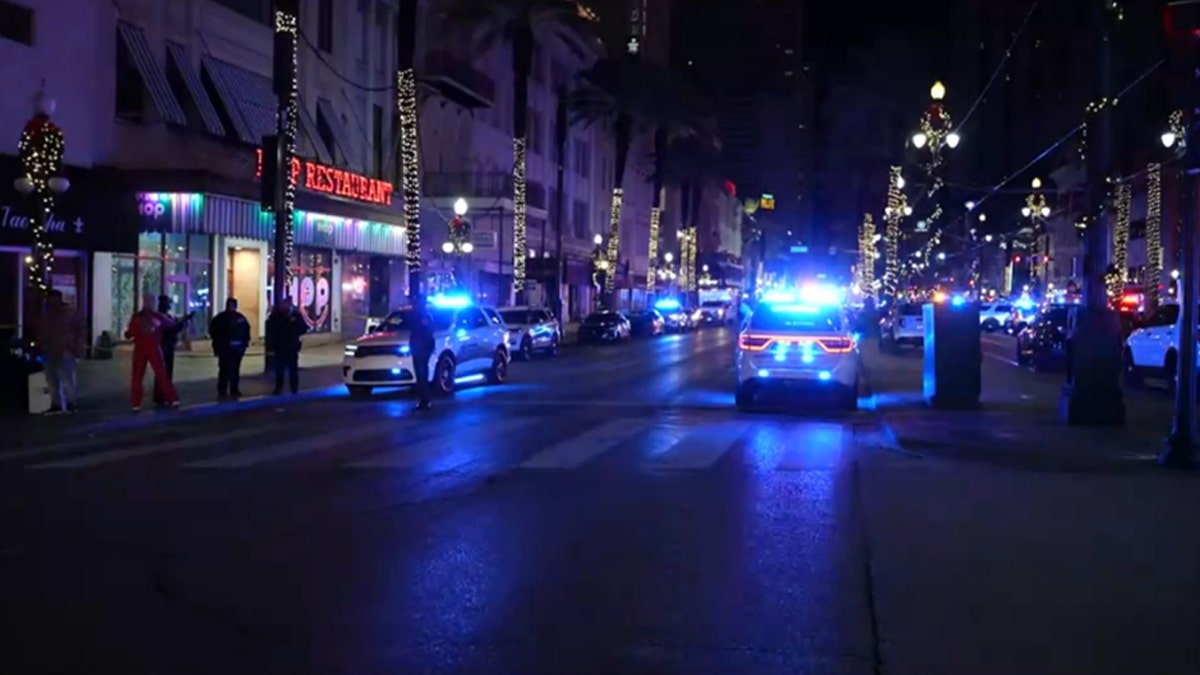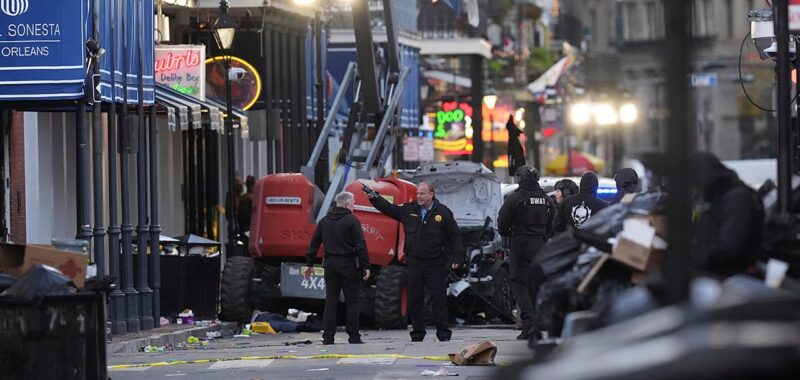During his first term as president, Donald Trump saw the height of a violent civil war in Syria, a resurgence of Islamic State activity, and a rise in ISIS-inspired attacks both abroad and on U.S. soil.
Eight years later, many of these bogeymen have returned.
In the last eight weeks, Syrian rebels launched a lightning offensive, wresting back control of the country and then of its capital—forcing longtime ruler Bashar al-Assad to flee to Russia for safe haven. Like Trump’s first term, the instability in the Middle East has prompted fresh questions over if, or what role the U.S. should play in Syria—amid concerns that failing to act will further open the power vacuum in Syria, making it ripe for exploitation by Islamic State militants and other terrorist groups.
And on Wednesday, U.S. authorities scrambled to investigate and respond to two separate attacks in New Orleans and Las Vegas. Despite taking place thousands of miles apart, both are being investigated as possible acts of terrorism—a glaring indicator that the threat of homegrown extremism remains just as pervasive as ever.
Ahead of Trump’s second term, the violence—and the unexpected collapse of Syria’s authoritarian regime— have prompted new questions as to how the U.S. might act.
BOMB-MAKING MATERIALS FOUND AT NEW ORLEANS AIRBNB POTENTIALLY TIED TO BOURBON STREET TERRORIST: REPORT

Law enforcement officers from multiple agencies work the scene on Bourbon Street after at least ten people were killed when a person allegedly drove into the crowd in the early morning hours of New Year’s Day on January 1, 2025 in New Orleans, Louisiana. Dozens more were injured after a suspect in a rented pickup truck allegedly drove around barricades and through a crowd of New Year’s revelers on Bourbon Street. The suspect then got out of the car, opened fire on police officers and was subsequently killed by law enforcement. (Michael DeMocker/Getty Images)
Options for Trump
Trump, for his part, has long opposed the idea of involving U.S. troops in foreign wars. In 2019, he ordered the complete withdrawal of all military personnel in Syria’s north.
He reiterated that view in a post last month on Truth Social, saying the U.S. should “have nothing to do with” the situation in Syria.
“Let it play out,” he said.
It’s unclear whether, or to what degree, this week’s deadly attacks may have swayed Trump’s decision. Fourteen people were killed in New Orleans early Wednesday morning by Shamsud-Din Jabbar, a Texas native and U.S. army veteran who had driven from Houston to Bourbon Street in a rented pickup truck, plowing through crowds of people massed outside the famed string of bars to celebrate the new year. Jabbar himself was fatally shot by police.
FBI officials said that Jabbar, who had affixed an Islamic State flag to the rented vehicle, was “100% inspired by ISIS” in carrying out the terrorist attack, though it remains unclear whether he has any legitimate ties to the group.
Jabbar had pledged allegiance to the Islamic State and is believed to have joined the group this past summer, officials said. He was also seen on surveillance footage planting two explosive devices in coolers along the corners of Bourbon and Orleans Streets, and another intersection nearby, though both were later rendered safe by bomb squad teams.
Separately, the FBI said they are investigating a Las Vegas explosion carried out in a Tesla Cybertruck outside the Trump hotel in Las Vegas as a possible act of terrorism.
The suspect in that case, Matthew Alan Livelsberger, had been a member of the U.S. Army’s elite special forces unit prior to the explosion, and FBI officials raided a house in Colorado Springs on Thursday that they said they believe could be connected to the case.
CLICK HERE FOR THE LATEST FOX NEWS REPORTING ON THE TRUMP INAUGURATION

Investigators search the rental home used by Shamsud-Din Jabbar in New Orleans, Louisiana on Thursday, January 2, 2024. (Kat Ramirez for Fox News Digital)
Should Trump opt to maintain his longtime opposition to U.S. intervention in “foreign wars,” there are other options he could take to try to crack down on violent domestic attacks. This could include cracking down on immigration— a policy long embraced by Trump and many Republicans in Congress—to prevent possible threat actors from crossing the border.
In fact, the Department of Homeland Security told reporters in June that it had identified more than 400 migrants from Central Asia and other countries who had been smuggled into the U.S. by ISIS-linked smuggling groups over the last three years, prompting a flurry of new arrests and “subjects of concern” designations.
DHS officials said the arrests, first reported by NBC, were made out of “an abundance of caution,” and noted at the time that they had not identified any credible threats to the U.S. by the migrants, who may have simply been attempting to find a way to cross into the U.S.
Still, a border crackdown might not be enough to solve the problem, made especially complex by the role of lone-wolf threat actors and individuals who become radicalized online.

At least 10 people are reported dead after a driver plowed a car into a group of people on Bourbon Street. (WVUE)
A pervasive threat
The FBI has focused heavily on the risk of terrorism posed by domestic and homegrown violent extremists, as it noted in its most recent “Worldwide Threats to the Homeland” report.
These small groups or individuals pose the biggest risk to national security, the report noted—often using easily accessible weapons, such as guns and cars, to attack so-called “soft targets,” or groups of civilians gathered en masse at accessible locations.
The “greatest, most immediate international terrorism threat to the homeland” are individuals who have lived primarily in the U.S. and who carry out actions inspired by, but not at the express direction of, a foreign terrorist organization such as ISIS, the law enforcement agency said.
Early in December, the FBI and other authorities warned of a heightened risk of vehicular attacks by lone-wolf offenders during the holidays, noting in a shared bulliten that threat actors have “plotted and conducted attacks against holiday targets” in previous years, with likely targets including public places with “perceived lower levels of security” holding large gatherings.
The threat is also not going away. Trump’s first term as president saw multiple attacks carried out by individuals pledging allegiance to ISIS or other jihad groups—even if they had not been operating at the direction of the group itself. These individuals were responsible for the 2016 Pulse nightclub shooting, the 2017 New York City truck attack, a 2017 machete attack at a Middle Eastern restaurant in Columbus, Ohio, and many more acts of violence.
Vehicular attacks have also increased: Since 2014, there have been at least 16 vehicular ramming attacks in the U.S. and Europe carried out by individuals practicing jihad, according to a report from the think tank New America.
CLICK HERE TO GET THE FOX NEWS APP
And since 2020, the number of domestic terrorism investigations conducted by the FBI has more than doubled—a staggering rate that indicates both the scope and the complexity of the growing problem.
Speaking to reporters at a press briefing on Thursday, FBI officials said the suspect in the New Orleans attack, Shamsud-Din Jabbar, was “100% inspired by ISIS.”
“First and foremost, let me be very clear about this point,” the FBI Assistant Director of Counterterrorism, Christopher Raia, told reporters. “This was an act of terrorism. It was premeditated and an evil act.”

